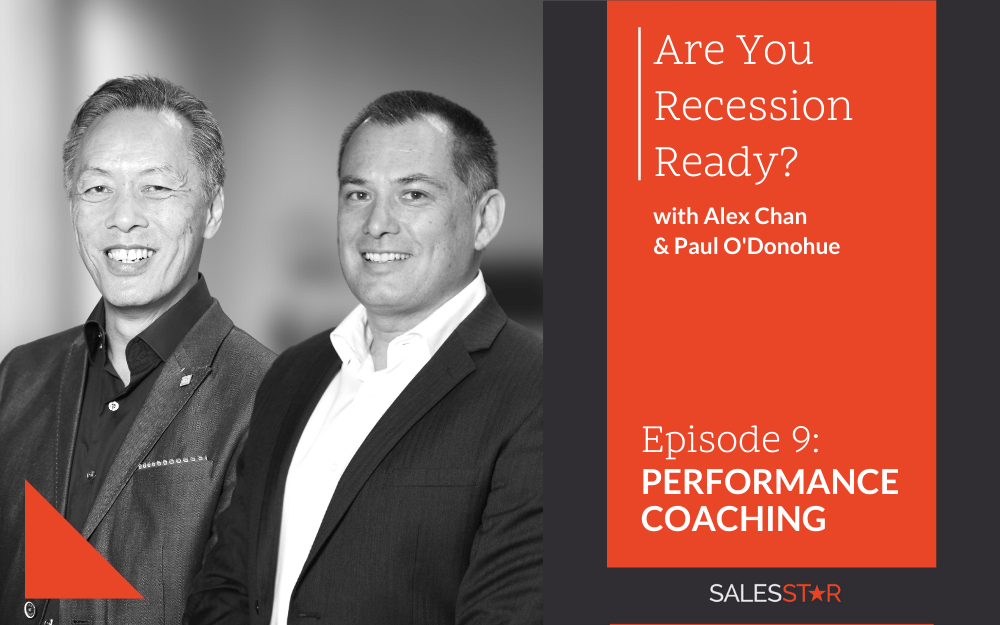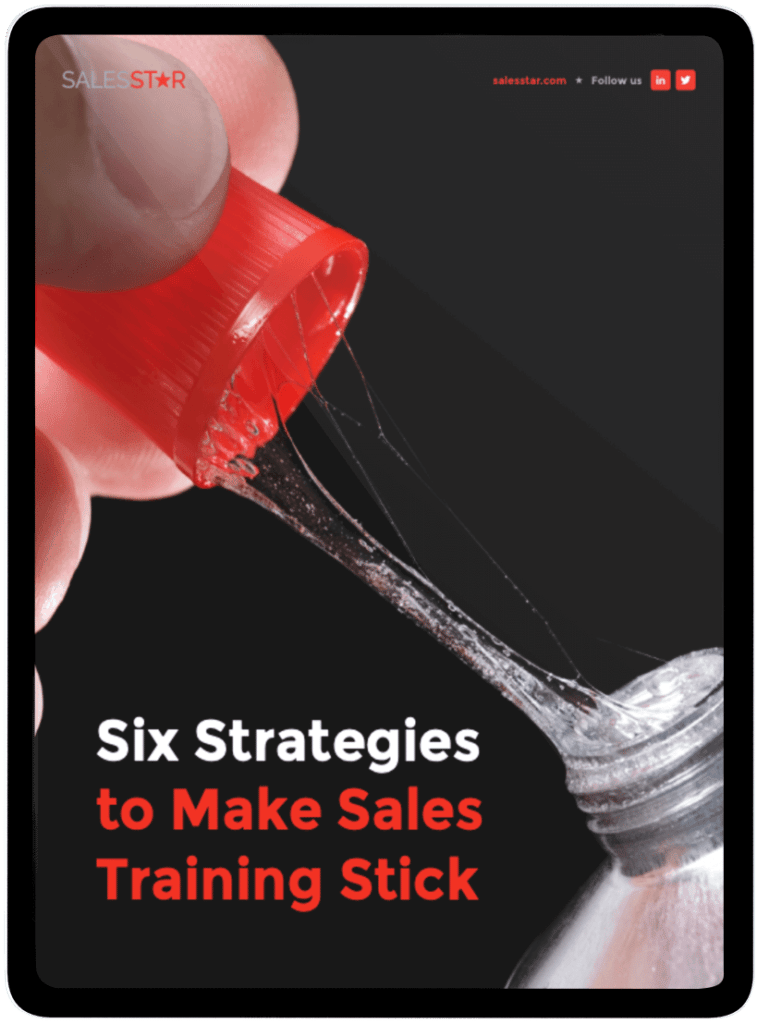Episode Transcript
Alex Chan | Paul O’Donohue
I have a question for you. If you’re a business owner or CEO, are you recession ready? This session covers step number nine of the SalesStar nine step high performance pathway, and that is performance coaching. And here with us today to help us to discuss this matter is SalesStar founder and CEO Paul O’Donohue. Paul, leaders, can their legacy be that of really helping their staff to learn so much more? Could that be a great leadership trait?
I think it’s probably the number one quality of a leader. You know, it’s to grow future leaders. That’s the way the lens I always look at. But, you know, fundamentally good leaders are good coaches and sales leaders really need to coach their sales team to high performance. And our previous video we talked about skill set and that’s often linked with training. But what we know about sales training is by itself, it just simply doesn’t work. You know, one off. Training doesn’t work. You don’t embed the skills that you need to really make permanent changes. Research basically indicates that when you sit in a classroom and you’re drinking out of a fire hydrant, yet you only retain 10% of what you learn.
So Paul, I know that as a leader, I have to coach my staff. I’ve got to go out in the field with them. I’ve got to get the team together to do some training, maybe during our sales meetings, maybe during our one on ones. But the problem is, I don’t have time, Paul. What would you say to that?
I think every sales manager says that. But fundamentally, what are they doing? At least 50% of their time should be out coaching the team. So there’s so many different types of coaching. You know, it is in-field coaching and we I see this so many times where sales leaders sit in the ivory towers. They don’t even go out in the field. You know, it’s not till you see where the rubber hits the road. Do you understand how effective your sales people are? You know, when you watch them in action, it gives you a good opportunity to see if they’re following the set sales process we talked about earlier, you know, are they missing key steps and actions? You know, how do we just performance them up to give them some soft skills to make them that much more effective? Well, we don’t know that unless we’re actually witnessing that. I love what the pandemic has done, Alex, where a lot of our discovery calls and now presentations are done by video based delivery. So it is no excuses. You know, you can either be in person, you can watch a recording or you can use some sophisticated software which we use, which is REFRACT, which weaves AI into conversations, and it does all the heavy lifting for you. You know, the tone, the pace, the key words of salespeople get flagged and you’re able to coach to a recording and send it back to the salesperson. So, you know, that’s just to name a few, few steps. What are the other steps? Pre-call coaching. Make sure making sure your sales people are in the right mindset, you know that they’re clear on the objectives of their call. So, you know, it’s a little bit like a coach coaching a sports team, you know, said that sort of that “pre-game” before they hit the field. We want to make sure that they’re in the right mindset and remind them of the the strategies at play.
The locker room huddle. Okay and of course when they come back from the call as the post call coaching just to debrief what are the action points. And one of course that I’m known to ask is did you discover their pain points? Because that is the determination factor and determination as to whether or not that was a great call or not. But look, there’s several different kinds of coaching. We mentioned pre-call cool post-call coaching. We talked about in-field coaching and you even mentioned screening side by side screen based coaching as well, which they can either watch the recording of will do it virtually live. But there’s one thing I also want to raise on this particular session and that is deal specific coaching. Now in this particular economic climate where things are tough, that’s really important to actually coach them through specific opportunities, isn’t it?
It’s absolutely critical. So part of the strategy when you’re selling in tough economic conditions is spend more time on winnable deals right? So part of our coaching should be taking deals, the deal specific coaching with our salespeople. And the way to do that is your regular one on ones. You should have a standard formal coaching session with your salespeople weekly And what do you do on that coaching session? Well, not only are you looking at the activity and holding them accountable to it, but you’re inspecting the pipeline and where those deals are. Do they have a balanced pipeline? So I’d like to take a deal and I’d like to then transpose the sales process on that deal. And I think your question was valid, like what was the pain? That’s a really good question to start with. And look, if salespeople haven’t identified what the pain was for prospect, it isn’t that real-well qualified, right? No pain, no gain. We know pain is the biggest driver to increase by motivation. So really there are some checks and balances within your sales process to qualify or disqualify. That should be overlaid in the process, but we should also be qualifying the decision making process. Like getting clear on that? Like in this economic environment, how does your company go about making decisions to buy services or products? With a company like us? And not many salespeople would use that? Well, not many companies would bake that into these sales process, but it’s all about keeping control and qualifying and every which way you can.
Paul, thanks for sharing that with us. I’m always reminded when I used to run leadership workshops and I would ask people who was a great leader that you thought of and they would pick people. And quite often the reason that they would give for choosing them as a great leader, and I quote them directly, they say, because they taught me so much. Great leaders are great coaches. Thanks for sharing your insights with us today. Is there something that that you can offer our people to help them on their journey with regard to their coaching and particularly the performance coaching?
Oh, there’s many assets, but the one that we’re offering today, Alex, is the six strategies to make training stick. There’s a lot of good coaching topics there. It’s not all about training, as I mentioned earlier. So let’s make it sticky. Let’s change the behavior, people, and let’s go out there and grow market share.
Okay. Thanks for joining us, Paul. So we’ve covered the nine steps of the nine step high performance pathway, but if you really want to speed up your results and get there faster. Reach out to somebody who’s experienced, reach out to a SalesStar high performance coach because they’re there to help you. And remember also to watch out for the key strategic moves later in this series. We’ll see you there.








